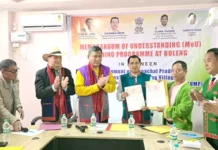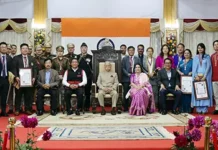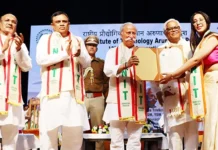Monday Musing
[ Tongam Rina ]
Recently, the National Socialist Council of Nagaland (IM) sent out a diktat to the legislators of Tirap, Changlang and Longding (TCL) districts to withdraw their support from Chief Minister Pema Khandu and Deputy Chief Minister Chowna Mein.
The diktat came in reaction to a circular issued by the Longding deputy commissioner that the scheduled tribe certificates and permanent residence certificates will henceforth be issued in the name of the tribe of the district.
The decision of the administration followed the union government’s amendment of the ST list, as recommended by the Arunachal Pradesh government, by which Nocte, Tangsa, Tutsa and Wancho were added to the list, deleting the words ‘Any other Naga tribe’, which was used earlier instead of the names of the tribes.
The amendment did not go down well with the NSCN (IM), which claims the region as part of the greater Nagalim and sees the deletion of the words ‘Any other Naga tribe’ as snubbing and undermining the larger Naga identity.
The latest threat to the elected representatives by the NSCN (IM) is yet another indicator of how influential the violent group is in the region.
The group continues to meddle in all spheres of life, from collecting taxes from reluctant common citizens, government employees and businesses to interfering in party politics. Whenever their line is not towed, the consequences are brutal.
The citizens of the TCL region are often caught in between, as the violent confrontations between the Indian armed forces and the NSCN (IM) have not stopped even after the signing of the framework agreement on 3 August, 2015, to find a lasting solution to the Naga issue.
On an earlier occasion, the NSCN (IM) had sought clarification on the validity and extent of the ceasefire agreement between the union government and the NSCN, asking “whether there is ceasefire in Naga inhabited areas of Arunachal Pradesh state or not.”
While there has been no reaction from organizations and political parties in the state, or even the government, to the latest threat by the NSCN (IM), the Eastern Naga National Government (ENNG) reacted with a statement. Propped up by the Indian state to counter various Naga groups operating in the region, the home-grown ENNG, which also has members from the Chakma community, termed the threat a “wrong step by NSCN (IM).”
On the other hand, the National Socialist Council of Nagaland (K)-Nikki Sumi faction summoned the village chiefs, gaon burahs, presidents and panchayat members from Tirap, Changlang and Longding for a meeting in Dimapur in Nagaland at the end of September.
Reportedly, there was no attendance from the region.
The ENNG once again issued a statement, saying that no one should attend a meeting which had no agenda.
With factions gaining traction yet again in the region post lifting of the Covid restriction and the framework agreement still in limbo, uncertain times just got extended.
At this point, it may not be the most important but is still a relevant reminder that the resource rich TCL region has always been politically influential and plays a huge role in the making and unmaking of chief ministers.



